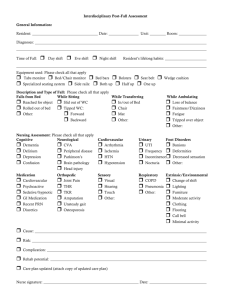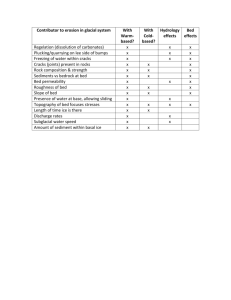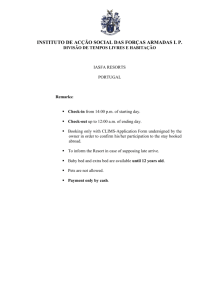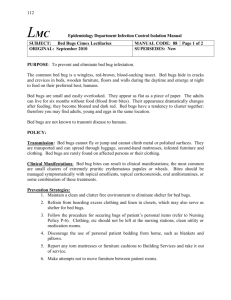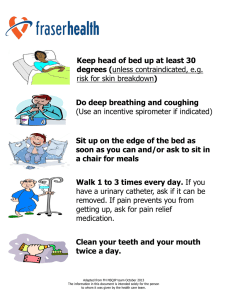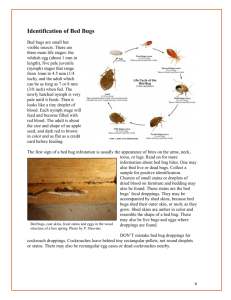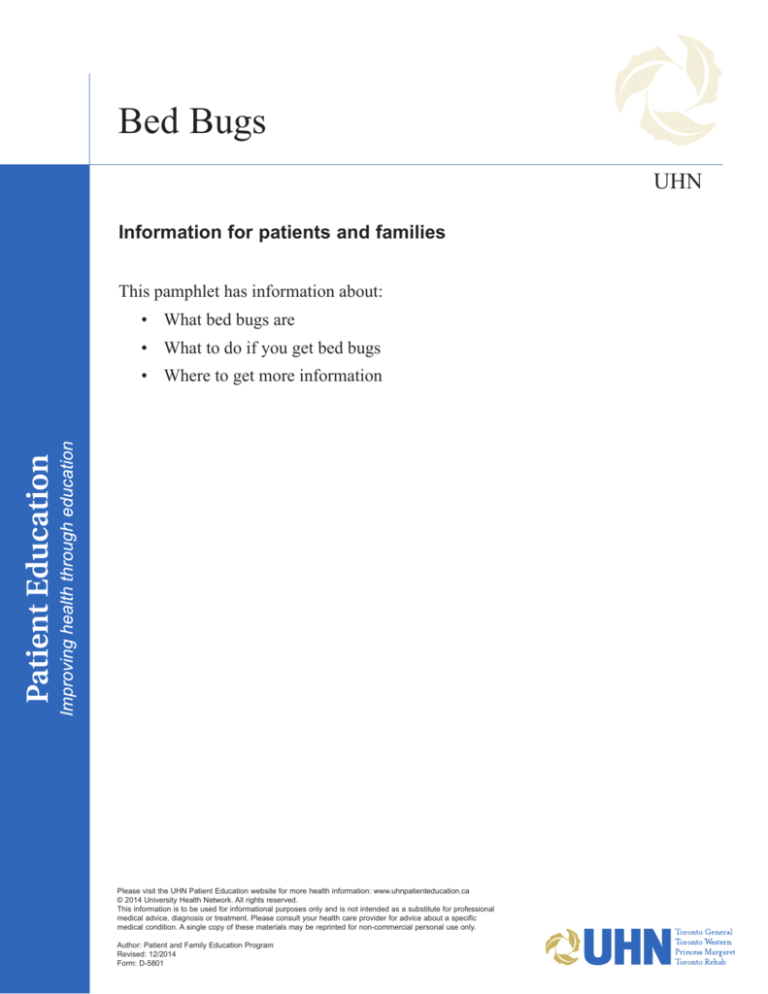
Bed Bugs
UHN
Information for patients and families
This pamphlet has information about:
• What bed bugs are
• What to do if you get bed bugs
• Where to get more information
Please visit the UHN Patient Education website for more health information: www.uhnpatienteducation.ca
© 2014 University Health Network. All rights reserved.
This information is to be used for informational purposes only and is not intended as a substitute for professional
medical advice, diagnosis or treatment. Please consult your health care provider for advice about a specific
medical condition. A single copy of these materials may be reprinted for non-commercial personal use only.
Author: Patient and Family Education Program
Revised: 12/2014
Form: D-5801
What are bed bugs?
Bed bugs are small, flat insects about 4 mm (¼ inch) long. They are parasites that feed
on the blood of humans and other mammals, usually during the night. Bed bugs can live
up to 1 year and lay hundreds of eggs.
After feeding they:
• turn dark red
• are larger in size
• look like an apple seed
Picture enlarged
Toronto Public Health
How do bed bugs move around?
Bed bugs can move up to 20 feet a day to feed. They do not move around on people.
They travel on clothes, shoes, purses, luggage and furniture. If you live in an apartment,
bed bugs can move between units along pipes, electrical wires and, through cracks and
other openings.
If you were close to someone who had bed bugs on their clothes or in their bags, there is
a chance that the bugs moved from that person and may now be attached to your clothing,
purse or other items.
2
I have been near someone who has bed bugs.
What should I do?
1. When you go home, take off all your clothes and
wash them in the hottest water you can. Dry all
items in the dryer at the highest setting for at least
20 minutes.
2. Put all your bags, backpacks, purse and any other
items you had with you in a large plastic bag.
Keep the bag in a separate part of your garage or
even outside. Call Toronto Public Health at
416-338-7600 for more information on how long
to leave these items in bags.
3. Look for bed bugs or bed bug bites on your body.
Bed bugs do not move around on people’s bodies,
but checking is still a good thing to do.
4. Look around your home for signs of bed bugs.
3
How would I know if there are bed bugs in my home?
Watch for these 5 signs of bed bugs
1. Bed bug bites. Bed bugs usually bite at night. Most times a person doesn't
know they have been bitten by a bed bug. You may think the bites are from
a mosquito. When bed bugs bite, they leave their saliva in your skin.
You may see:
• A rash on your body after sleeping, mostly around the face, neck, chest,
arms and hands.
• This rash can look like:
3 small bite marks in a row
raised, red dots
large, itchy red welts
people who are really sensitive to bed bug bites may find lumps filled
with blood or fluid
2. Small reddish-brown spots on your bed sheets or mattress.
3. Bed bug droppings (small black dots or a trail of dots) on your sheets.
4. Bug shell casings or eggs. They look pear-shaped. They are white and may be
in a group of 10 to 50 eggs.
5. If you have a lot of bed bugs, you may smell a sweet smell in your home like
raspberries, rotting raspberries, almonds or old, mouldy shoes.
4
Where do bed bugs live?
• The seams and folds of mattresses and furniture.
• On bed covers
• Cracks in the floors and walls
Bed bugs also hide:
• between cushions on couches, in drawers, behind the baseboards, under
rugs and edges of carpets, under chairs and beds, in the headboard of beds,
in curtains, and in telephones, radios and clocks
Check in all these places for live bugs, bug shell casings or their eggs.
What should I do if I have been bitten by bed bugs?
Most times, a bed bug bite will go away on its own without any special care. You should:
1. Keep the bite areas clean.
2. Try not to scratch. This can open the skin and cause
an infection.
3. If the bites are really itchy, talk to your pharmacist about over-the-counter creams. Or,
you can talk to your family doctor about creams and medicines that can help.
4. If you think your skin is infected (the bite area and skin around the bite are red, hot,
swollen and painful), go to your family doctor.
Do bed bugs carry disease? Can I get sick from bed bug
bites?
There is no proof at this time that bed bugs pass on diseases carried by the blood between
people.
Some people find that bed bug bites are very itchy. Scratching the bites may cause a skin
infection. This can be treated with antibiotic medicine.
5
I found bed bugs in my house. What should I do now?
First, make sure you really do have bed bugs. Call Toronto Public Health at
416-338-7600 or a pest control service.
The best way to deal with bed bugs is by using a pest control service. You can find a pest
control service in the telephone book or yellow pages online at www.yellowpages.ca.
They'll talk to you about what how to get rid of bed bugs.
Here are some things you can do now:
1. Look over your mattress and bed frame for bugs or eggs.
2. Using your vacuum and the thin nozzle or suction piece, vacuum all cracks,
baseboards, bed frame, and all items close to your bed.
3. Remove all your bed sheets, blankets, pillow covers, dust ruffle etc. and wash
everything in hot water. Then, place everything in the dryer on the hottest setting
(usually the “cotton” setting) for 20 minutes.
4. Move your bed away from the wall and tuck in all your sheets to make sure that they
are not touching the floor.
5. If possible, buy some caulking at your local hardware store. This is the “putty” used
to seal around windows and doors, taps and sinks. Fill in any cracks between your
baseboards, in your walls, and floors.
6. Use the caulking to seal around electrical boxes and telephone jacks, and where pipes
and wires come into our home.
7. Remove and repair any loose wallpaper.
8. Tighten up any loose light switch covers.
9. Watch closely for more bed bugs. Set out some glue boards or sticky tape, such as
carpet tape or duct tape to catch bed bugs on the move.
10.Look over items you bring into your home for bed bugs.
Even, if you use a pest control service, you may see bed bugs alive for up to 10 days.
This is normal. If you still see live bugs after 14 days, call the pest control service again.
6
Who can I call for help?
Local Health Department
Toronto Public Health: 416-338-7600
Call 3-1-1 for information on how to call other health departments in the Toronto area.
For more information
Toronto Public Health Bed
Website: www. toronto.ca and search for “bed bugs”
Health Canada
Website: http://www.hc-sc.gc.ca and search for “bed bugs”
National Institute of Health: Medline Plus
Website:
http://www.nlm.nih.gov/medlineplus/bedbugs.html
Mayo Clinic
Website:
http://www.mayoclinic.com/health/bedbugs/DS00663
Pest Control
Effective Control of Bed Bugs, Health Canada, Pest Management Regulatory Agency
http://www.pmra-arla.gc.ca/english/consum/bed_bugs-e.html#2
Adapted from Toronto Public Health Fact Sheet – Bed Bugs
7



